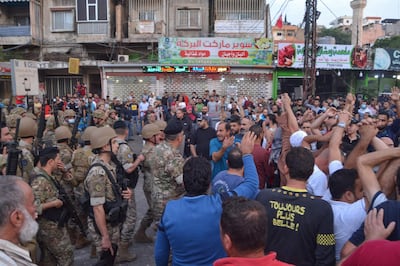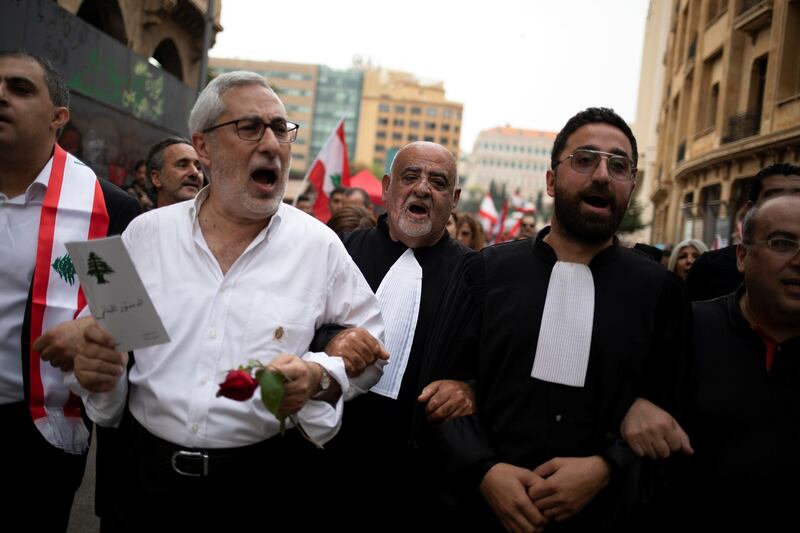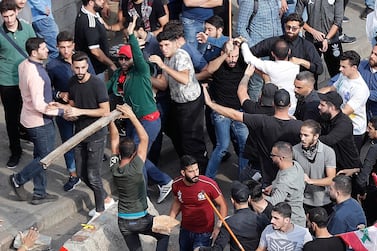“We just want to take them all down,” said Rita, a protester in central Beirut who has, for the past 10 days, been rallying against the government.
She is part of the hundreds of conversations taking place in the streets as Lebanon’s protests enter a crucial stage and demonstrators grapple with the question of how to turn mass anger into tangible action.
“Right now, we’re trying to get together to create a step two. Everything is up in the air, but we know we want to take them [the traditional parties] down and that’s going to be tricky if we don’t have a proper group or someone to come and voice out all of the things we’re trying to achieve,” she said.
On Saturday in Beirut's Martyrs' Square, Lebanese American University academics led conversations about what comes next. In the city's distinctive ‘Egg’ building – a cinema left derelict during the 1975-1990 civil war – American University of Beirut professor Carmen Geha led a discussion on electoral laws.
Although several lists of demands have emerged from the nearly two-week protest movement, nothing has yet brought people from northern Tripoli to southern Tyre together into a cohesive movement.
Increasingly professional bodies and groups are throwing their weight behind the protesters. Fenasol, a powerful trade union group, backed the demonstrations from early on and called for a general strike.
“It is important that the professional syndicates and others aggregate to show they are part of what is happening here,” said Bashir Sayek, a Lebanese lawyer based in Paris who travelled back for the rallies and stood with around 20 or so colleagues in central Beirut in their legal gowns.
He criticised the Beirut Bar Association for not taking a formal stance on the movement but said they wanted to demonstrate that the profession was part of the protests. He pointed out how vital the judicial system can be to ending impunity around corruption. “The judiciary, the lawyers are going to be a necessary or a significant tool... in getting this fight across,” he said.
Since October 17, mass demonstrations have closed the centre of the Lebanese capital. Roads across the country have been blocked and cities nationwide have joined together in huge rallies, ostensibly against a proposed raft of new taxes but mostly about corruption, inequality and poor governance.
Political leaders have scrambled to come up with a response to the mass anger. Throughout last week, political sources were briefing that parties were in talks to resign and allow Prime Minister Saad Hariri to form a technocratic government with a mandate to fix the dire economic situation and unlock $11 billion (Dh40.4bn) in loans and grants from the international community.
But that has now, it appears, gone out the window.
On Friday afternoon, Hassan Nasrallah, the leader of the powerful, Iran-backed Hezbollah movement, addressed the nation.
In a rare sight, the militia-cum-political party leader delivered his speech against the usual plain-blue background but at his right shoulder was a Lebanese flag. His appearance had the air of a presidential address, even though the speaker holds no official office.
His more than hour-long speech contrasted sharply with the few minutes of heavily edited sound bites offered a day earlier by the country’s actual president, the 84-year-old Michel Aoun.
But Nasrallah was clear. There would be no Cabinet reshuffle, no resignations and the country would now return to normal.
At almost the same time as he addressed the country, several dozen Hezbollah supporters started fights with protesters in central Beirut.
Angered at what they said was unacceptable criticism of the party and its leader, they attacked people in the crowd.
Riot police moved to separate them from the main body. Nasrallah called his supporters to leave the streets, but the intervention – the second in as many days – made many nervous. At the time of the confrontation in mid-afternoon, many of those out in central Beirut were families with young children.
On Saturday, the heads of Lebanon’s security bodies met at the army headquarters to discuss a plan to reopen roads and get the country back to work.
If the authorities are successful on Monday, one of the main weapons the protest movement has to apply pressure on the government would be gone.
And that threat seemed clear at the weekend.
Sami Nader, the director of Levant Institute for Strategic Affairs in Beirut, told The National that the reason the main centre of the protests in Beirut seemed quiet over the last 48 hours is that people were putting all their focus into shutting roads.
“I think the test today was if they were terrorised by the acts and speech of [Hezbollah] yesterday, by the black-shirt mob. There’s a little less [people] in the square in Beirut but the battle today is to keep roads closed and if you see the determination they’re putting into it, I think they have the momentum,” he said.
But the authorities moving to clear protesters from the streets alone could lead to a significant change in the atmosphere, which has been largely peaceful so far.
On Saturday, shots were fired as the army tried to open roads around Beddawi, north of Tripoli.

Videos shared online purporting to cover the incident show scores of soldiers shooting before it panning down the street to reveal several people lying on the ground.
The details of the incident remain unclear but the Red Cross said it took three wounded people to hospital.
In Beirut, police used batons and sticks to move protesters off the main ring road around the city centre only for it to be closed again a few hours later by a few hundred people waving Lebanese flags.
Mr Nader said incidents like this and the fight with Hezbollah supporters might “succeed in terrorising the people, but this will feed the anger and feed the momentum”.
He added that “this kind of act, in my view, will deepen the problem. If they take it to the end there will be no trust from the international community and [it will] show Hezbollah is really in control.”







